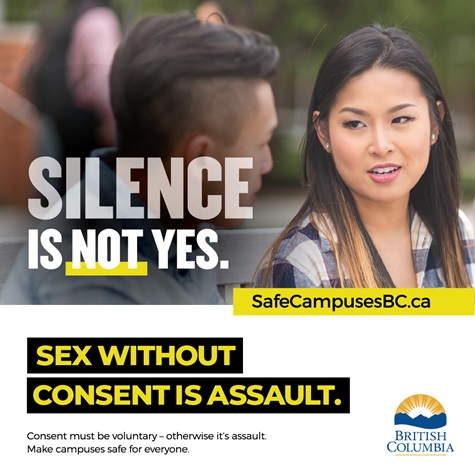Source: BC Ministry of Advanced Education and Skills Training

With the start of a new winter term, the Province’s sexualized violence prevention campaign is reopening conversations about consensual sexual behaviour.
The relaunch of the “…Is Not Yes” campaign raises awareness about preventing sexualized violence, consent and available supports for post-secondary students, faculty and staff.
“Students deserve safe campuses, and it is our collective responsibility to educate everyone about consent," said Anne Kang, Minister of Advanced Education and Skills Training. "This campaign encourages the necessary conversations about consent – what consent is, what it looks like and the vital role it has in preventing and responding to acts of sexualized violence. We all must work together to foster a culture of consent on B.C.’s campuses, and the ‘…Is Not Yes’ campaign provides useful information to support us in doing that.”
The "...Is Not Yes" campaign also promotes free educational resources available to the post-secondary community and highlights various student support services offered by B.C. colleges and universities.
The campaign relaunches on Jan. 27, 2022, and continues through the month to coincide with on-campus student orientation at the beginning of each semester.
To reach new and returning students, campaign materials have been shared with student and faculty organizations at all 25 public post-secondary institutions across B.C. and to private post-secondary colleges and universities.
“We want all post-secondary students, especially new students, to feel empowered and supported on campus, whether they’re attending classes in-person or virtually," said Grace Lore, Parliamentary Secretary for Gender Equity. "This campaign will increase awareness and understanding of consent, which fosters safe and inclusive spaces within the post-secondary community. The Gender Equity Office continues to work with the Ministry of Public Safety and Solicitor General to further support a culture of consent, prevent violence and support survivors through the development of a provincial action plan to end gender-based violence this year.”
In partnership with the post-secondary sector and BCcampus, the provincial government has also launched a new, free training resource called Safer Campuses for Everyone. This resource is accessible to all post-secondary institutions and can be adapted to each institution’s learning management system to meet the needs of students, faculty and staff.
Safer Campuses for Everyone supports the “…Is Not Yes” campaign by offering opportunities for campus communities to learn more about:
- the meaning and impact of sexualized violence;
- the importance of consent in all relationships;
- how to intervene to prevent sexualized violence; and
- how to support people who have experienced sexualized violence.
“Every student has the right to a post-secondary experience that is safe from sexualized violence," said Maia Lomelino, president of the Capilano Students’ Union. "We appreciate that this campaign is bringing new training to post-secondary institutions to make sure that staff, faculty, administrators and students have the resources they need to respond to and support survivors of sexualized violence on our campuses. The ongoing effort to end sexualized violence on post-secondary campuses is of the utmost priority. This is not an easy battle, but we are glad we have more resources and ways to keep fighting.”
Digital advertisements are scheduled to run on major social media platforms, including Facebook, Instagram, Twitter and Snapchat in addition to online dating apps. To further the campaign’s reach in students’ cultural spaces, some materials are also available in Chinese and Punjabi.
“Unwanted sexualized behaviours range from sexual jokes, inappropriate sexual comments and touching to sex without consent," said Ninu Kang, executive director of Ending Violence Association of BC. "Those who identify as women are at the highest risk to be sexually assaulted during their time of post-secondary education than at any other time in their lives. The ‘…Is Not Yes’ campaign coupled with the new resource, Safer Campuses for Everyone, will start the conversations on campuses that need to happen to empower survivors and bystanders and to prevent sexual assault.”
If you or someone you know is a victim of sexual assault, contact VictimLinkBC, a toll-free, confidential, multilingual service available across B.C. and the Yukon 24 hours a day, seven days a week, by calling or texting 1.800.563.0808 or sending an email to
VictimLinkBC@bc211.ca. You can also call your local police or 911.
Quick facts
In section 273 of Canada’s Criminal Code, consent is defined as the voluntary agreement to engage in sexual activity. Silence or passivity is not consent.
Safer Campuses for Everyone is a four-module, 75-minute training resource offered online that focuses on a decolonized and inclusive approach to discussing sexualized violence and consent.
Students, faculty and staff can access Safer Campuses for Everyone through their respective post-secondary institution’s learning management system.
Consultations were conducted in November 2021 to gather input from key stakeholders within the sector about improving future iterations of the campaign.
Learn more
To find out more about the “…Is Not Yes” campaign materials: https://www2.gov.bc.ca/gov/content/safe-campuses-bc/making-campuses-safe
To access Safer Campuses for Everyone (students, faculty and staff), visit: https://bccampus.ca/safer-campuses-for-everyone/
To learn more about post-secondary sexualized violence policies: https://www2.gov.bc.ca/gov/content/safe-campuses-bc/help-on-campus
To find out more about the Sexual Violence and Misconduct Policy Act: https://www.bclaws.gov.bc.ca/civix/document/id/complete/statreg/16023_01